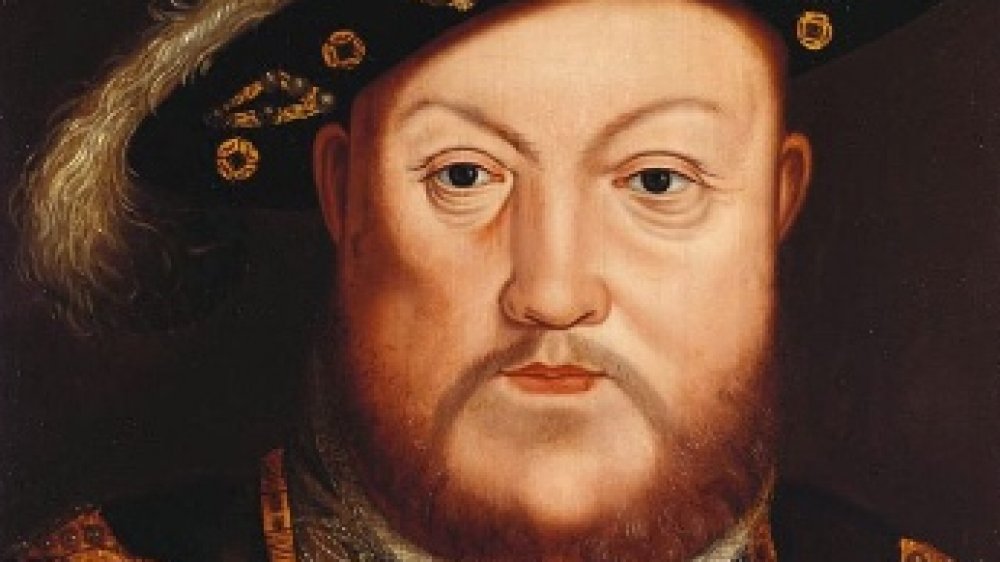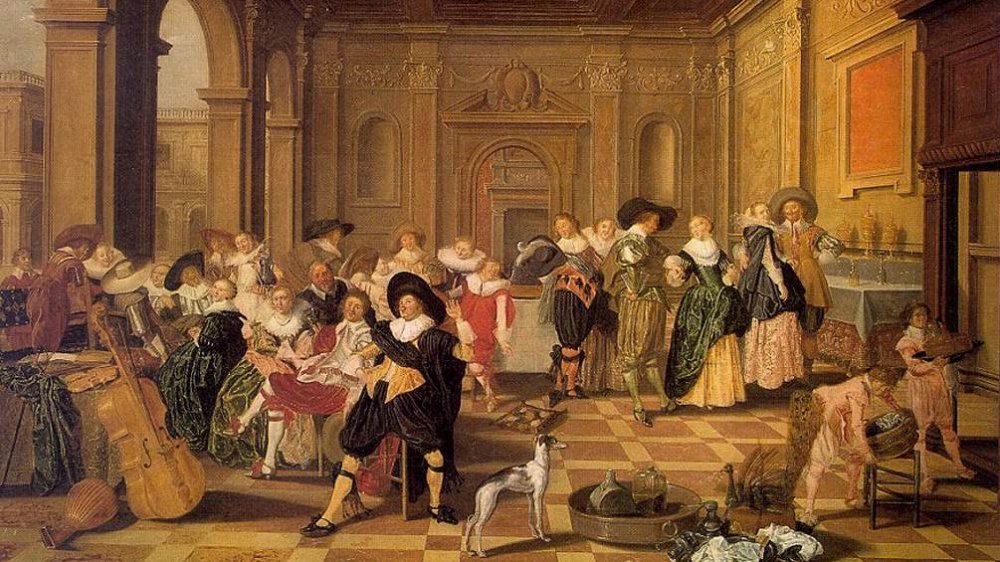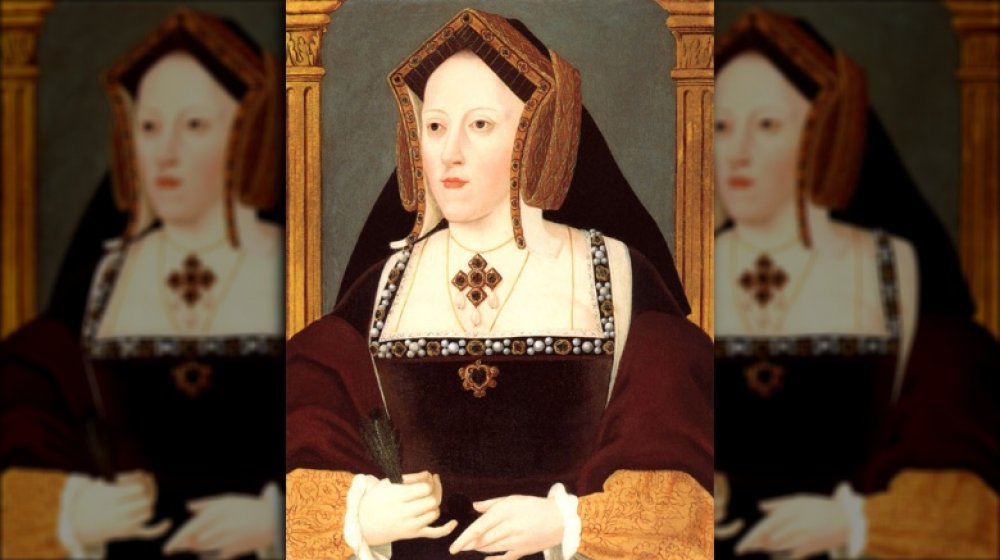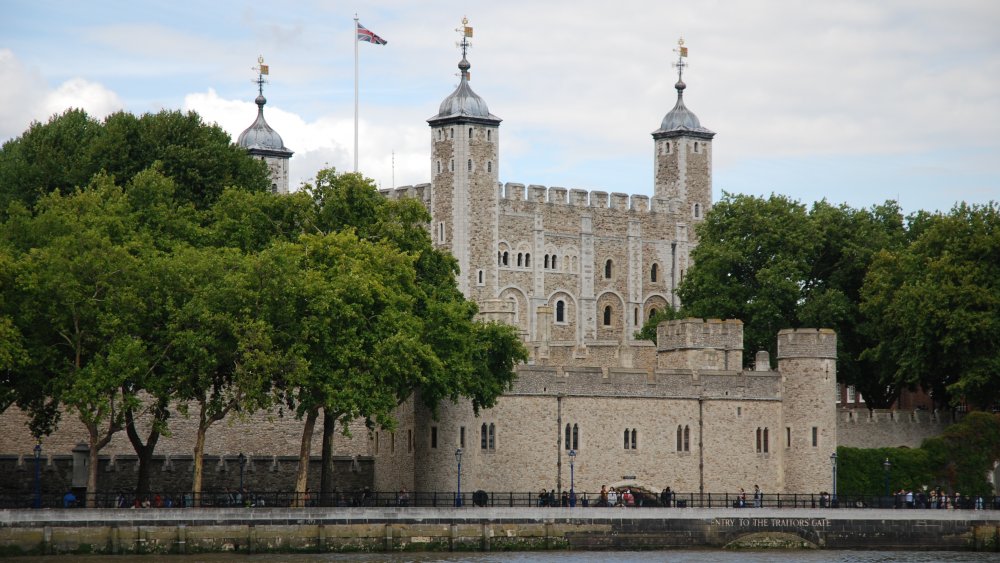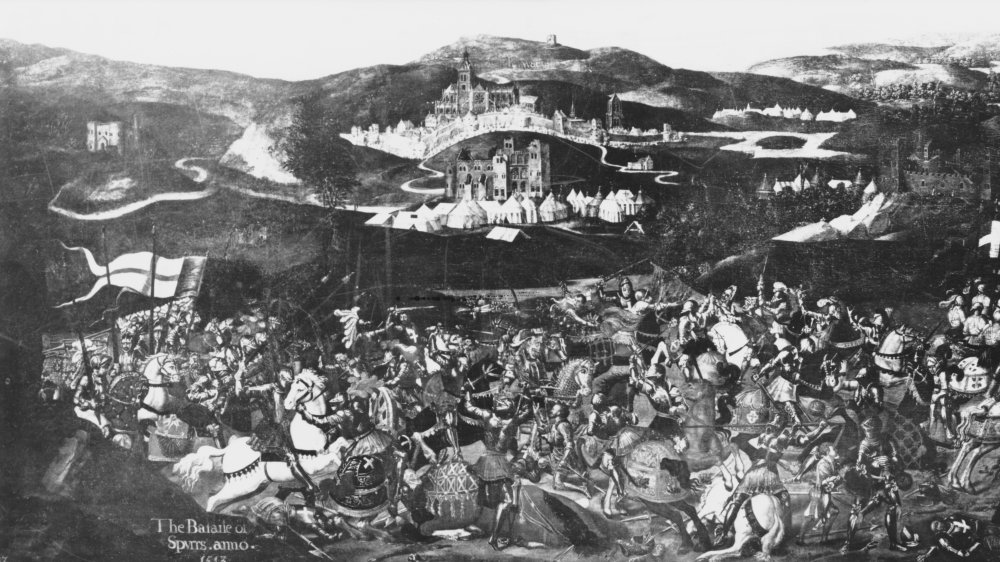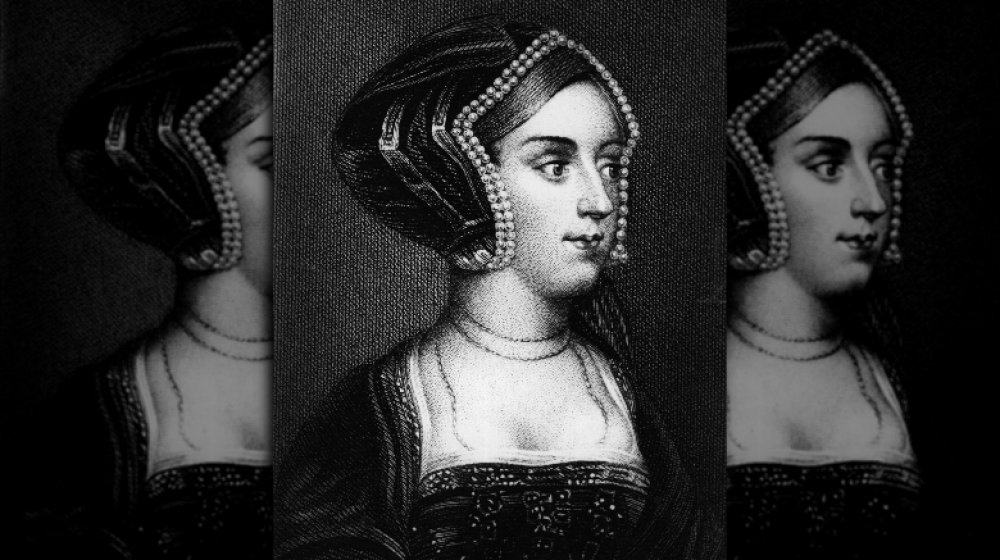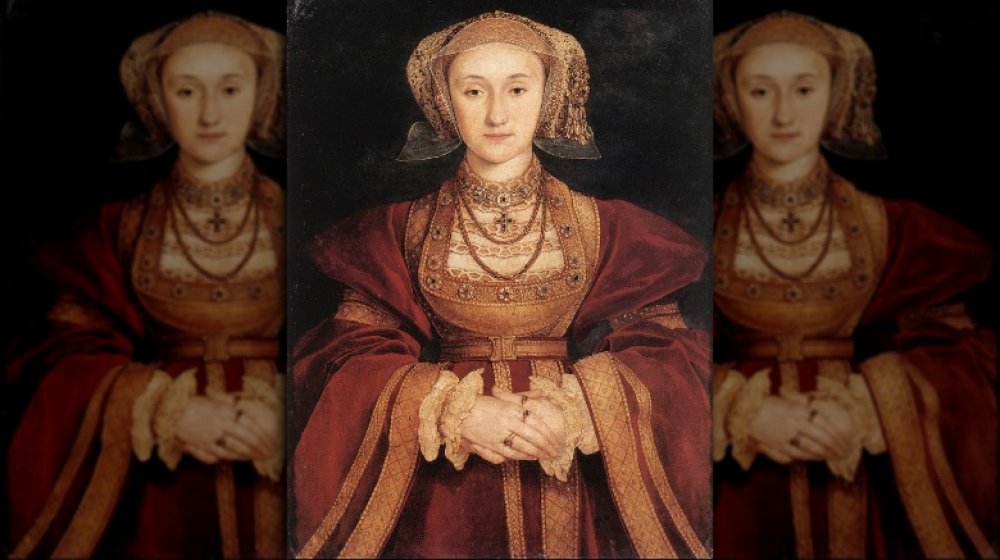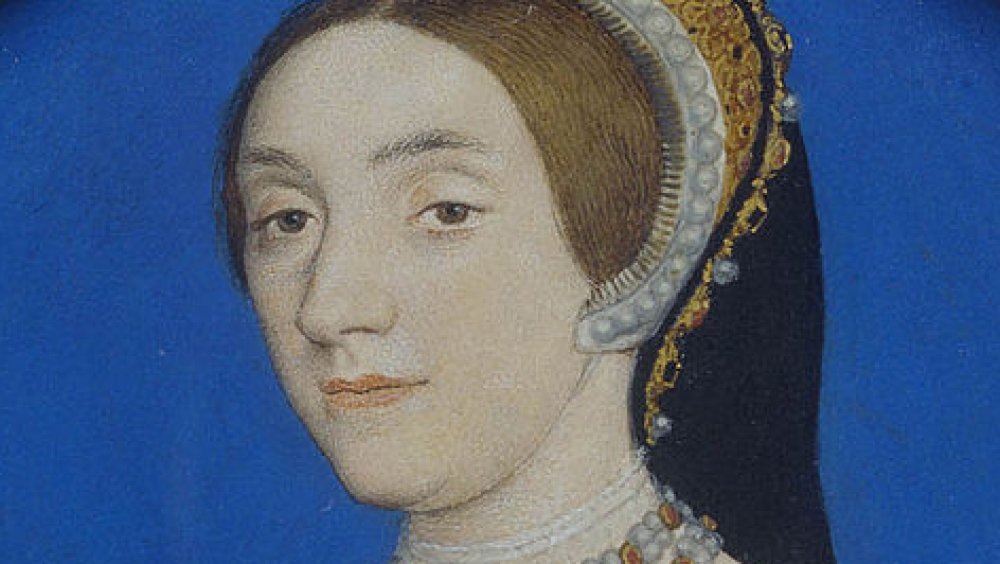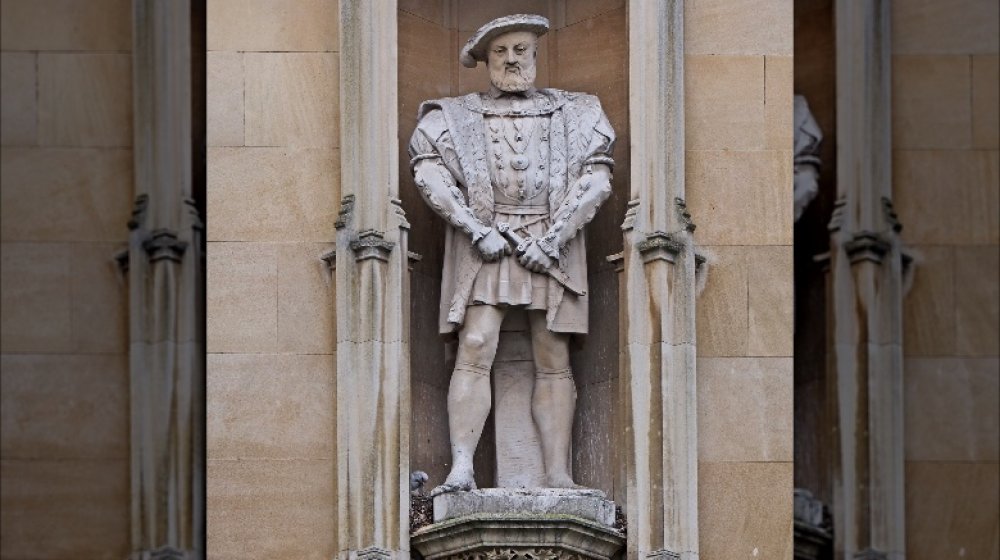The Messed Up Truth Of Henry VIII
No one remembers Henry VIII fondly. He murdered two of his six wives, divorced two more, lost one in childbirth, and died before he could murder the last one. When you ask pretty much anyone what Henry VIII was all about, they'll mostly just repeat some version of the above, because when you're a wife-killing, smelly egomaniac with zero redeeming qualities, it doesn't really matter what else you did in your life. People are going to remember you for being a wife-killing, smelly egomaniac with zero redeeming qualities.
But Henry VIII was so much more than just those things. He was also greedy, paranoid, a hypocrite, a homophobe, a perpetual loser of wars, and gross. He was very, very gross. Did he have any actual, redeeming qualities? Not that we know of. If he did, they were overshadowed by all of the very bad things he did during his long, awful reign. What bad things? These bad things. Here's the horrible, messed up truth of Henry VIII.
Henry VIII squandered all of his money
Henry VIII inherited a wealthy kingdom from his dad, the late Henry VII who no one remembers because he was overshadowed by all of the really awful things that his son did. Anyway, when Henry VII left this world, he had the equivalent of £375 million ($494 million), which went to his son, who was all, "Cool, how can I waste this on lavish parties and crap I don't need in the shortest amount of time possible?"
According to History, the court of Henry VIII was one of history's most opulent. Evidently, no one taught Henry the value of money when he was a child, because just one year after inheriting the throne at the age of 18, he blew most of the kingdom's annual revenue on Christmas parties. Yes, everyone loves an epic party, and plenty of modern people go into debt so that they can buy nice things for everyone on their holiday list, but imagine spending £13.5 million ($18 million) in a single year. Henry's holiday expenses included food, entertainment, and gifts.
That kind of excess continued throughout all of Henry's reign. In fact, he was so into parties that he expanded the kitchens of Hampton Court Palace so they filled 55 rooms. Banquets frequently served up to 14 courses to 600 people and included dishes like grilled beaver tails, whole roasted peacock, and boar's head. So you could say Henry ate his kingdom's fortune, and that would actually be close to accurate.
He invented a new religion so he could get a divorce
Henry VIII had a pretty well-known legacy of being at odds with the Catholic Church. It wasn't always like that, though. Henry was once a staunch defender of Catholicism. According to History, he even held the title "Defender of the Faith," given to him by a grateful pope when he personally argued against Protestant Reformation leader Martin Luther. So that was all well and good until the pope started doing stuff that he didn't like.
By 1527, it became clear that Henry's first wife, Catherine of Aragon, wasn't going to give the king a son and heir. The solution to that problem was pretty simple — Henry could divorce her and marry someone else. Oh, and there was that one court lady, Anne Boleyn, that he was into. So you know, it was pretty cut and dry as far as the king was concerned. The pope saw it differently, though. Henry argued that because Catherine had been briefly married to his brother, Arthur, the marriage was against the will of God, hence the absence of male children. But the pope was all, "Hmm, that didn't seem to bother you when you married her, so no." And Henry was all, "Fine, I'll just invent a new religion — the Church of England — then become Supreme Head and grant my own divorce." And that's pretty much exactly what he did, although it was many, many years in the making. It's good to be the king.
He didn't just kill a couple of wives
Henry's contemporaries liked to remember the king's body count being somewhere in the neighborhood of 57,000 to 72,000 executions. According to The BS Historian, that was like 2.6 percent of the entire population of England, so the number is probably not super accurate. However, it is true that Henry executed a lot of people. Anyone who didn't agree with the Act of Succession, for example, was considered guilty of treason. You couldn't even criticize Henry's marriage. Ironically, the Act of Succession required everyone to take an oath recognizing Anne Boleyn as the rightful queen and all their children as legitimate heirs to the throne, though evidently Henry himself never took that oath since he had Anne executed and their daughter declared illegitimate after Anne failed to give him the son he wanted.
But that's not all. Henry also executed heretics, potential rivals to the throne (including a 67-year-old woman), the associates of both his doomed wives, the leaders of the uprising called the Pilgrimage of Grace, and Thomas Cromwell. The real number of dead probably never reached 1,000, though, and definitely never approached 72,000. But a few hundred is still an awful lot of heads.
Henry VIII executed a nun
Among Henry's many victims was a woman named Elizabeth Barton. Now, you're probably not shocked to hear that Henry executed women, because duh, Henry executed two of his own wives. But it might be kind of shocking to hear that Henry also executed a nun, because nuns mostly seem pretty harmless. Well, unless you went to a Catholic school staffed by nuns armed with wooden rulers, then you probably have a different take.
Anyway, Elizabeth Barton was a nun, and Henry didn't like her. Why? According to The Anne Boleyn Files, Barton was sort of a minor celebrity because she'd become a nun not long after she began having visions "of marvelous holiness in rebuke of sin and vice." And one of her many visions had to do with the divorce of Henry VIII and Catherine of Aragon. Barton predicted that the divorce would be Henry's downfall. If he married Anne Boleyn, she said, Henry would lose his kingdom and "die a villain's death." This was obviously a threat to Henry's long tradition of doing whatever the heck he wanted to do without rebuke, so he had Barton arrested. He then made up a bunch of stuff about her improper relationships with priests and coerced her into saying she'd just made up all of her prophecies. Then he executed her and gave her the dubious honor of becoming the only woman to ever have her head put on a spike on London Bridge.
He destroyed England's monasteries so he could have their stuff
Believe it or not, there are perks to inventing a religion and declaring yourself its Supreme Head, besides just being able to grant your own divorce and everything. Once you abolish the old religion, you can basically just go around demolishing everything that had anything to do with the old religion, and then you can keep everything that's valuable. Nice.
According to Historic UK, after Henry's Act of Supremacy in 1534 where he declared himself the leader of the newly formed Church of England, he started eyeballing the monasteries, which were not only symbols of the Catholic Church but also symbols of the Catholic Church that had a lot of money. And let's not forget how much Henry liked to spend money. With his own coffers mostly drained from all of his lavish parties, Henry decided to seize the property of all the monasteries in England. In lands alone, that amounted to roughly a quarter of all of England's farmland.
So first, Henry had the small monasteries shut down, sort of as a test to see how much he could get away with. That seemed cool, so he started dissolving the bigger monasteries, and then selling the land off to his supporters. Any monks, friars, or nuns who complained got executed. The total take for Henry was around £1.5 million, which was basically enough to fund about 1/10th of the year's Christmas parties, but whatever. All's fair in love and the destruction of religious institutions.
Henry VIII was really bad at war
Most people are self-aware enough to know that they shouldn't spend money on things they're bad at. Well, maybe not everyone, but if your funds are limited, you usually don't enjoy squandering them on things that can only bring embarrassment. Henry had no such qualms. He liked war, even though he stank at it. Granted, he probably only liked war because he thought there would be financial gain or power at the end of it, but he never seemed to figure out that war never did anything for him except cost him a lot of money.
According to History, during Henry's reign, he attempted to conquer Scotland, which ticked off the Scots and encouraged them to ally with France. Meanwhile, Henry alienated the Holy Roman Emperor, who was his first wife's nephew, because of the whole "I want to divorce your aunt thing." And when you alienate your allies, they generally don't want to help you fight your dumb wars.
Henry went to war with France three times, though the third time he was so overweight he couldn't ride a horse anymore and had to be carried to the battle lines on a litter. By the end of the war, he'd gained the port of Boulogne, but he was practically bankrupt so it wasn't even worth it. Also, Henry's son Edward sold the port back to France, which makes it all extra not worth it, but by then, Henry was dead.
Henry VIII paid some poor guy to wipe his butt
Today's Secret Service agents have to accompany the president to the bathroom and to the butt doctor, so that's super glamorous and definitely worth the grueling hours and marginally acceptable pay. But if you're a Secret Service agent and you're reading this, we'd like to promise you that it could be worse. A lot worse.
According to History Extra, Henry VIII had a "groom of the stool," and although it's possible "stool" might've referred to a piece of furniture you put your feet on, it also had another very literal meaning. Grooms of the stool did exactly what you're thinking — they wiped the king's butt and changed his underwear. So, ew.
You might think that such a position would be degrading and humiliating, but it wasn't. Well, it was, but it also came with a ton of power. The groom of the stool not only wiped the king's butt and changed his underwear, but he also managed the king's personal finances, which means he was pretty much in charge of England's wealth. Was it worth it? You'd have to time machine back to the Tudor years and ask someone who held that position. Or you could ask a modern financial adviser if they'd have chosen a different career path if butt wiping and underwear changing was a part of the job description. It's kind of not hard to guess at the answer.
He passed England's first anti-gay laws
It probably won't surprise you to hear that Henry VIII was homophobic, because it's not like he was trying to hide any of his other, much more frowned-upon qualities or anything. But in Henry VIII's time, homophobia wasn't exactly considered to be a stain on a person's personality, so when the king passed England's first law criminalizing gay people, there wasn't a whole lot of backlash. In fact, there was exactly zero backlash, because gay rights weren't a thing and wouldn't be for several hundred years.
According to the British Library, Henry's shiny new law, which he passed in 1533, was called "the Buggery Act," and it decreed that sex between men would heretofore be punishable by death. (To be fair, it also punished the act of sodomy between men and women and between people and animals, but let's not kid ourselves who the target was.) Henry did find the act super handy for his dissolution of the monasteries, as he often cited it as the reason for executing monks and taking all of a monastery's property.
The Buggery Act persisted well into the 19th century. The last two men executed for the crime died in 1835, so you could say that Henry VIII continued to be responsible for unjust executions for hundreds of years after his death. That's quite a legacy, your majesty.
Henry VIII mentally tortured Anne Boleyn before her death
Sure, Henry ordered an expert swordsman from France to come kill his second wife Anne Boleyn (before she'd actually been tried and convicted, but never mind) in the hope that the death itself would be mostly painless, but he also made the days before her death as emotionally awful as possible. So merciful, no, that didn't exactly describe the way Henry treated the woman he'd supposedly once loved.
According to History Revealed, Anne was accused of a set of elaborate, invented crimes — including adultery, incest, witchcraft, and conspiracy against the king. Anne was convicted and sentenced to death, but before her execution, she had to watch from her room in the Tower of London while her brother was beheaded on Tower Hill (although some historians think her room was in the wrong part of the tower and she probably couldn't see anything). Her own execution was delayed twice, which was awful for her. "I hear say I shall not die afore noon," she told the constable, "and I am very sorry therefore, for I thought then to be dead and past my pain."
Henry, of course, refused to see Anne in the weeks leading up to her execution, and within 24 hours of her death, he was betrothed to his third wife, Anne's own lady in waiting Jane Seymour. Don't ever say Henry wasn't a class act.
Henry VIII had his fourth marriage annulled because his wife was ugly
Kings can't go unmarried, even when they have their own wives murdered. So after the death of Anne Boleyn, Henry married Jane Seymour, but then Jane Seymour died of childbirth complications, and Henry found himself on the dating market once again. Unfortunately for Henry, there was no such thing as Royalty Tinder in those days, so he couldn't just swipe past Anne of Cleves' picture when he encountered it. Instead, he had to depend on an artist's rendering, and artists don't necessarily have to be totally honest. But hopefully whoever the artist was got the heck out of Europe after painting his extra flattering portrait of Henry's future fourth wife.
To be fair, The Anne Boleyn Files notes that Henry seems to have been the only one who thought Anne of Cleves was ugly. He disliked her so much that he evidently called her a "Flanders Mare," though it's somewhat questionable whether or not he actually used those words given that Anne wasn't from Flanders. At any rate, their brief marriage was never consummated, and Henry had it annulled not long after their wedding. But hey, she got a consolation prize — the title "right dear and entirely beloved sister," which came with a palace, a manor, and a steady annual income. Also, she got to keep her head. Not bad for one of Henry's wives.
Catherine Howard is still begging for mercy
There might've been some truth to the accusations that Henry's fifth wife, Catherine Howard, had been unfaithful. Let's face it, the poor girl was maybe 19 (some historians think 17), and she'd been coerced into a marriage with a grotesque man more than twice her age. Mostly, though, Henry got fodder for her execution from her past. He learned that his new bride had once been friendly with a couple of random dudes, but it was her relationship with Thomas Culpepper that really did her in. It's actually likely she committed adultery with Culpepper, since the pair had been betrothed prior to her marriage to the king.
In light of his newfound knowledge, Henry decided to retroactively make it a crime for an unchaste woman to marry the king. Now, if only poor Catherine had a time machine so she could've gone to the future to discover she was about to break a law that didn't exist yet. Anyway, according to Hampton Court Palace, Henry had her charged with treason, but before her execution, Catherine broke free from her guards and made a mad dash down a Hampton Court Palace hallway. She hoped to reach Henry in the chapel and make the case for her innocence. Instead, her guards dragged her screaming back to her room. Today, that hallway is called "the Haunted Gallery" because it's said that her ghost sometimes still runs down the hallway, screaming for mercy.
Henry VIII did not die well
A lot of the world's villains never really pay for their crimes, and Henry VIII was certainly never brought to official justice for all of the people he murdered and all the times he made the groom of the stool wipe his butt and change his underpants. Unofficially, though, he kind of got what was coming to him. He weighed nearly 400 pounds when he died, and as a result, he suffered from a myriad of health problems including ulcers on his legs that were constantly open, often infected, and really smelly.
According to the Tudor Society, he couldn't walk, which contributed to his weight gain. Plus, he binge-ate (usually around 5,000 calories a day), and he suffered from migraines related to a head injury he'd gotten while jousting. Without exhuming the poor dude, it's impossible to know the extent of his health problems, but it's likely he also had high blood pressure and type two diabetes. He probably died from renal and liver failure, leaving his sixth wife — Catherine Parr — almost certainly breathing a sigh of relief.
